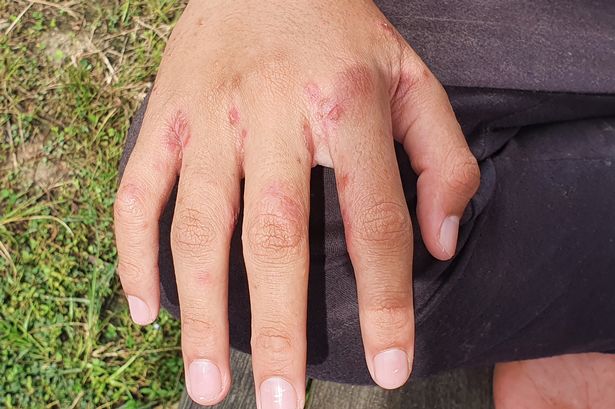Scabies infection can cause sensitive itchy skin (Image: Getty)Get daily celeb exclusives and behind the scenes house tours direct to your inboxMore Newsletters SubscribePlease enter a valid emailSomething went wrong, please try again later.More NewslettersWe use your sign-up to provide content in ways you’ve consented to and improve our understanding of you. This may include adverts from us and third parties based on our knowledge of you. More infoThank you for subscribing!We have more newslettersShow me See OurPrivacy Notice See OurPrivacy Notice×Group 28 Get daily celeb exclusives and behind the scenes house tours direct to your inboxInvalid emailSomething went wrong, please try again later.Sign UpNo thanks, closeWe use your sign-up to provide content in ways you’ve consented to and improve our understanding of you. This may include adverts from us and third parties based on our knowledge of you. More info×Group 28Thank you for subscribing!We have more newslettersShow MeNo thanks, closeSee our
Privacy NoticeA shocking rise in Victorian diseases has been reported, with hundreds of people requiring hospital treatment for conditions rife over a hundred years ago. NHS figures have shown a 66% increase in diagnoses of the itchy skin infection, scabies, across the country, with 5,661 primary and secondary cases identified. The skin condition, caused by tiny mites burrowing into the skin, can be extremely itchy but is usually treatable with creams or lotions. Experts believe that poverty and declining vaccination rates are contributing to the resurgence of diseases like measles, whooping cough, and scabies.
It is very itchy
(Image: Getty Images)
In Yorkshire alone, at least 320 people were treated in hospital for scabies in the year to March 2024, according to Yorkshire Live. Other Victorian diseases making a comeback include measles, which has resulted in 2,305 hospital visits and a five-fold increase in diagnoses, leading to at least 1,000 admissions in England. Measles typically begins with cold-like symptoms before developing into a rash, but can lead to serious complications if it spreads to the lungs or brain. Whooping cough has also seen a sharp increase in cases, with a threefold increase to 1,696 diagnoses this year. Gwen Nightingale, assistant director of Healthy Lives at the Health Foundation, has alarmingly linked poverty with an increased spread of diseases. She stated: “Not having enough income to sustain a basic standard of living can have a negative impact on health, through factors like cold, damp homes or an inability to access healthy foods.”, reports Gloucestershire Live. She added, “The stress of living on a low income can also negatively impact health. The Government has a choice as to whether it wants to perpetuate the current numbers of families living in poverty.” In response to this situation, she’s calling for action from the government to ensure people have enough money, proper housing, and green space availability to help curb these health threats. Sign up to OK!’s daily newsletter to get updates sent to your inbox for free
Measles cases have also risen
(Image: Getty Images)
Meanwhile there’s growing concern from the UK Health Service Authority about the spike in measles hospital admissions, raising fears over declining vaccination rates. A spokesperson issued a stark warning: “In addition to measles, many children are also missing out on protection against other serious diseases, including whooping cough, meningitis, diphtheria and polio. It is especially tragic to see kids suffer when these diseases are so easily preventable.” Steve Russell, NHS national director for vaccination and screening, agreed saying: “These worrying figures highlight that too many children are still not fully protected against diseases like measles and whooping cough, which can cause serious illness but are preventable. He stated: “Vaccines are parents’ best defence against these illnesses that’s why the NHS offers them free, saving thousands of lives and preventing tens of thousands of hospital admissions every year.” Mr Russell encouraged parents to check their child’s vaccination status. He advised them to contact their GP to schedule an appointment if necessary.Story SavedYou can find this story in My Bookmarks.Or by navigating to the user icon in the top right.Follow OK! MagazineFacebookTwitterMore OnHealth












